Demei's View - Wine Communication from a Chinese Winemaker
If you visit a vineyard in northern China in the winter season, you might wonder: where have all the grapevines gone? (Image 1)
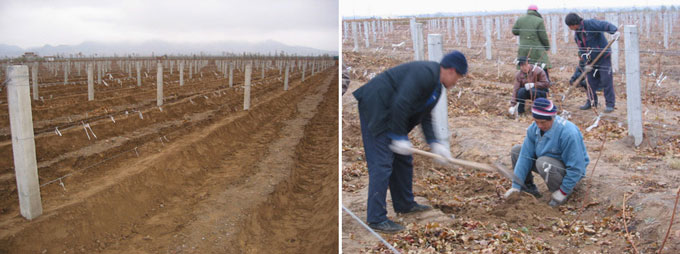
Because of the severe cold winter in northern China, vines must be protected in order to survive in the season, otherwise they will die. Generally speaking, the most effective and easy way is to bury the grapevines underground. This is a grand project for the vineyard managers.
Chinese scientists specialising in viticulture think that minus 17 degrees Celsius in the winter season is the line to separate the areas that need and don’t need to bury the vines. On the Chinese map, this line starts from Laizhou, Shandong Province in the east, passes through Jinan in Shandong, Xinxiang in Henan Province, Jincheng and Linyi in Shanxi Province, Dali, Jingyang, Qian County and Baoji in Shaanxi Province, Tianshui in Gansu Province, and then turns south towards Pingwu and Barkam in Sichuan Province and Lijiang in Yunnan Province. Vineyards located to the north of the line should be buried in winter; and the depth depends on how far away the vineyard is from the line (or rather the winter temperature in the local area).
Burying the vines is not a compulsive practice, but protecting the vines is necessary. It is just that we haven't found a more efficient method. With the climate condition in northern China, vines need to be protected against two threats: the winter freeze, and water shortage in the stems. This is why the freeze-tolerant Vitis amurensis can survive from the cold winter in northeast China (without any special protection), but struggled to live in northwest China despite the similar air temperature – it is not just cold in northwest China but also dry. The snow that covers the ground in northeast China can help to keep the water in the vines.
This topic reminds me of the Sino-French Cooperative Demonstration Vineyard of Vine Growth and Vinification established in 2003 by the two governments. Back then, the French experts reckoned that the grapevines used in the project could sustain the cold weather, as all the vines were from France and grafted, but the local Chinese experts disagreed; they even had a debate. Eventually, we came up with a plan: we decided to test the vines’ cold-resistant capability by choosing a line of vines and not burying them in the winter.
After all, we need to live with dreams. If the experiment succeeded, we thought, we might be able to solve a problem that has plagued the winegrowing in China for a long time!
I was the person that carried out the experiment. It was fairly easy: whilst other vines were buried under the ground, the vines in the test group were left there to ‘grow freely’ like all other wild plants. In the beginning of the spring, I collected stems with some 20 buds every week and put them into water in the room temperature for germination test. (Image 2)
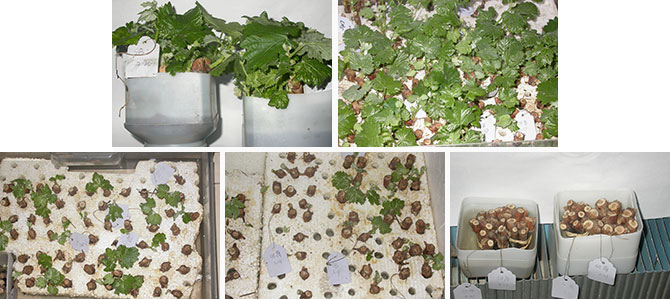
(from left to right, top to bottom) buds burst well on 20 February, buds burst well on 27 February, germination rate dropped on 5 March, germination rate dropped on 14 March, and nearly no budburst on 21 March © LI Demei
The result was very depressing: in the cold February, the buds on the vines that were naturally frozen in the winter burst well, but when the soil started to thaw, the germination rate began to drop. Until the vines were dug out at the end of March, the germination rate of the vines in the test group decreased significantly. It showed that the buds were not frozen to death in the cold winter, but died because of dehydration after the air temperature raised and the canes thawed.
The winter freeze is not the only hazard the vines would face in winter. The dry air that absorbs the water in the stems is another risk for the vine. Because China belongs to the continental monsoon climate, the rainy season comes with high temperature. If there is too much rainfall in the summer, the disease control and prevention will be very difficult, so wine grapes are mainly planted in the arid and semi-arid regions of north and northwest China where the summer is dry. However, the winter in these regions is cold and dry, which is a disadvantage for winegrowing.
For centuries, Chinese winegrowers ceaselessly fought with the nature while the European winegrowers enjoyed the wines. Now that the global warming hasn’t gotten ‘warm’ enough, we are constantly trying to explore the alternative methods to the traditional way of burying the vines. Unfortunately, for now, most of the Chinese winegrowers still have to bear with the management cost of the process of ‘removing off from the trellis – burying under the ground – digging out of the ground – putting back up the trellis’. The spending accounts for one third of the overall vineyard management cost, and it is not existent in other vineyards all over the world.
This practice became the major choke point for improving the vineyard planting technology and management mode. It inevitably causes some mechanical damage to the vines; it restricts the use of machine in the vineyards; in order to have enough soil to bury the vines, the vines have to be planted to lower densities, which reduces the land utilisation. It is even more difficult to bury the old vines, so you can imagine that the good effects bring by the old vines are weakened because of the practice of burying vines.
This year, the digging out started from the Yanqi Basin in Xinjiang, followed by Fangshan District in Beijing in mid-March, Huailai and Changli in Hebei Province at the end of March, Ningxia at the beginning of April, Wuwei, Gansu Province and Manas Basin in Xinjiang in mid-April, and finally in Jilin Province at the end of April. Bud burst has been underway a while in Shangdong and Yunnan Provinces, where the winter burying is not necessary. The Merlot in Deqin, Yunnan (Moet Hennessy Shangri-La Winery) has even begun flowering.
Life goes on no matter how difficult it is. Once again we pray and look forward to another good vintage.
Translated by Nina Fan Feng / 冯帆
All rights reserved by Future plc. No part of this publication may be reproduced, distributed or transmitted in any form or by any means without the prior written permission of Decanter.
Only Official Media Partners (see About us) of DecanterChina.com may republish part of the content from the site without prior permission under strict Terms & Conditions. Contact china@decanter.com to learn about how to become an Official Media Partner of DecanterChina.com.


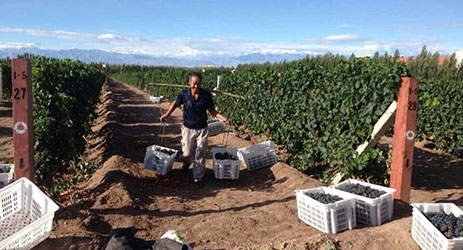
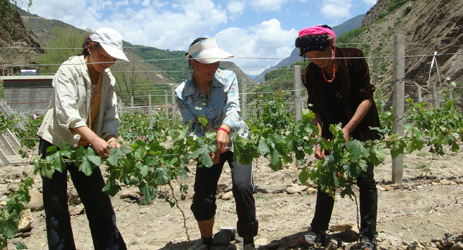
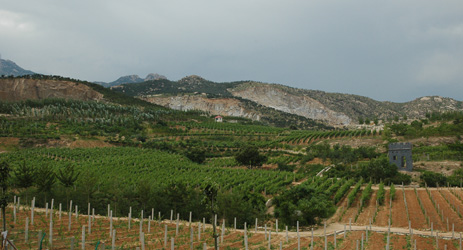
Comments
Submit